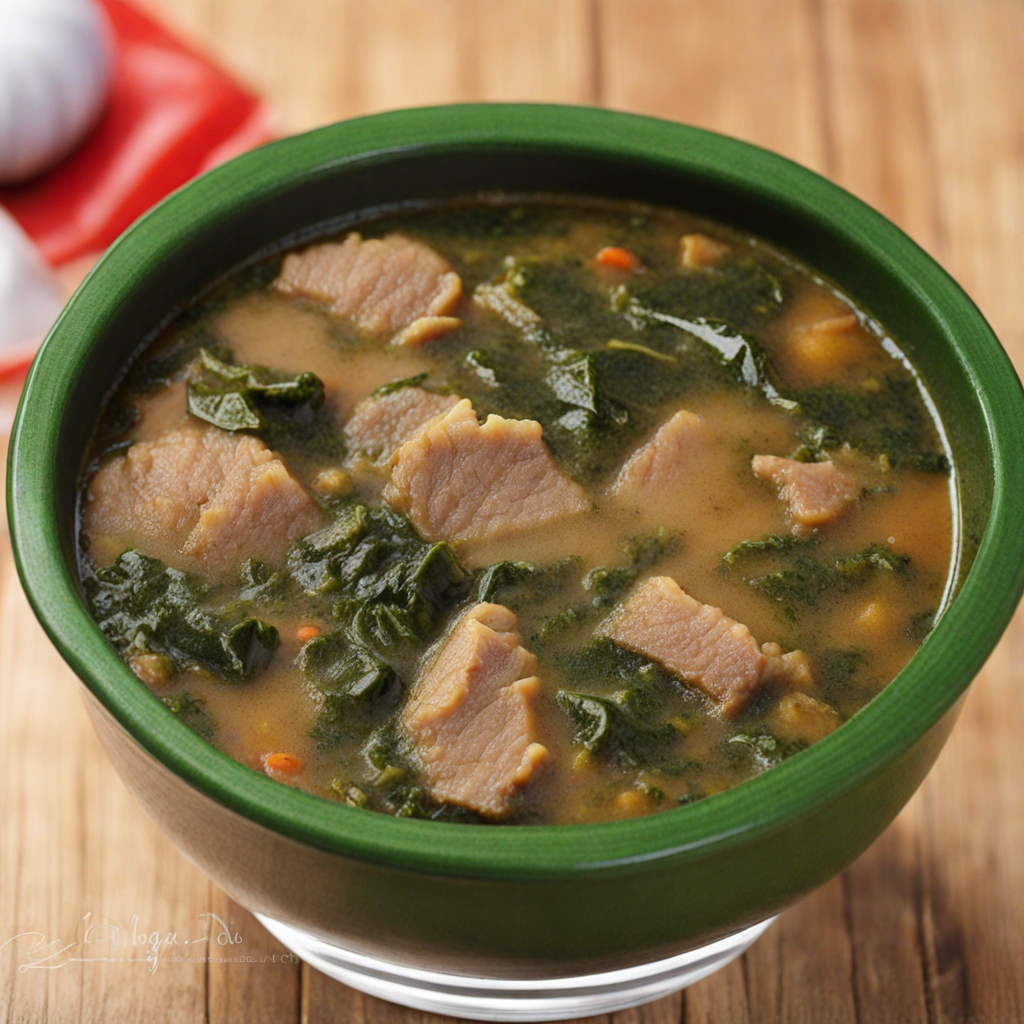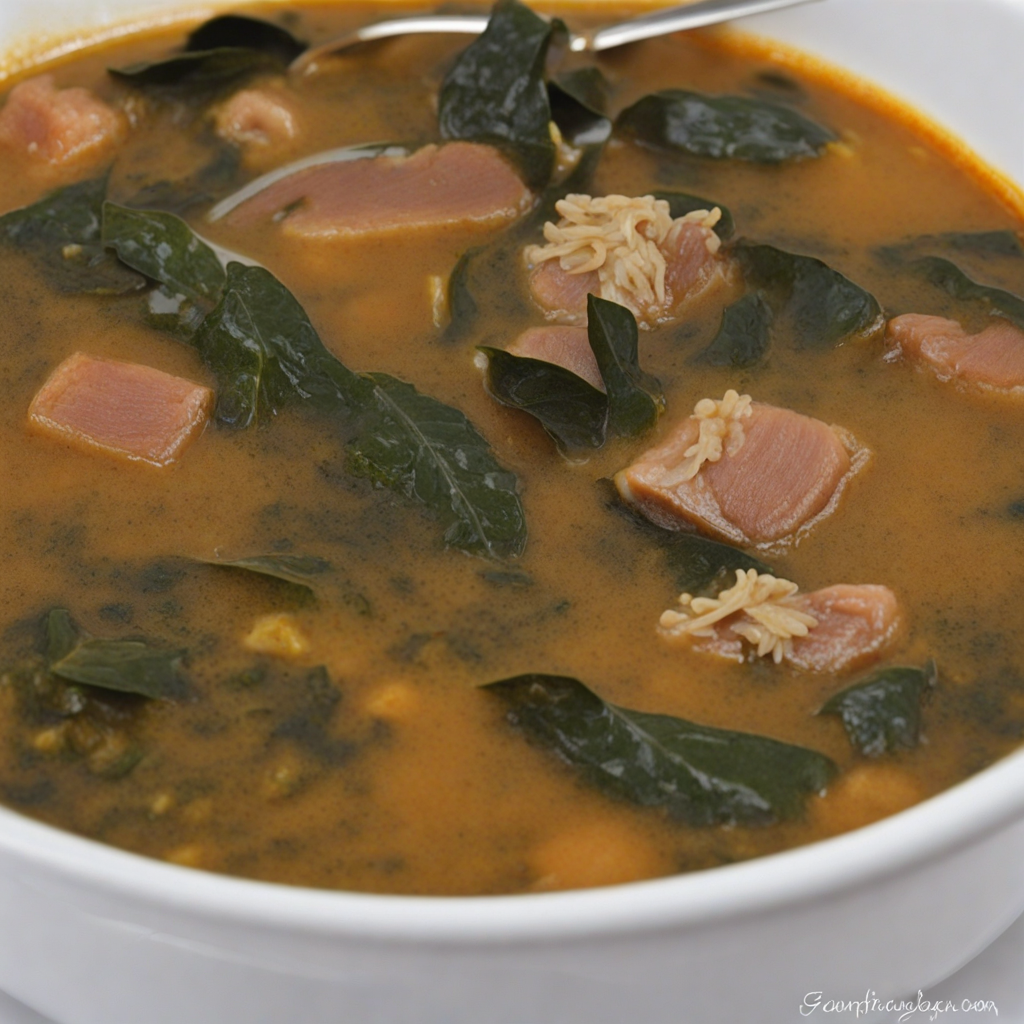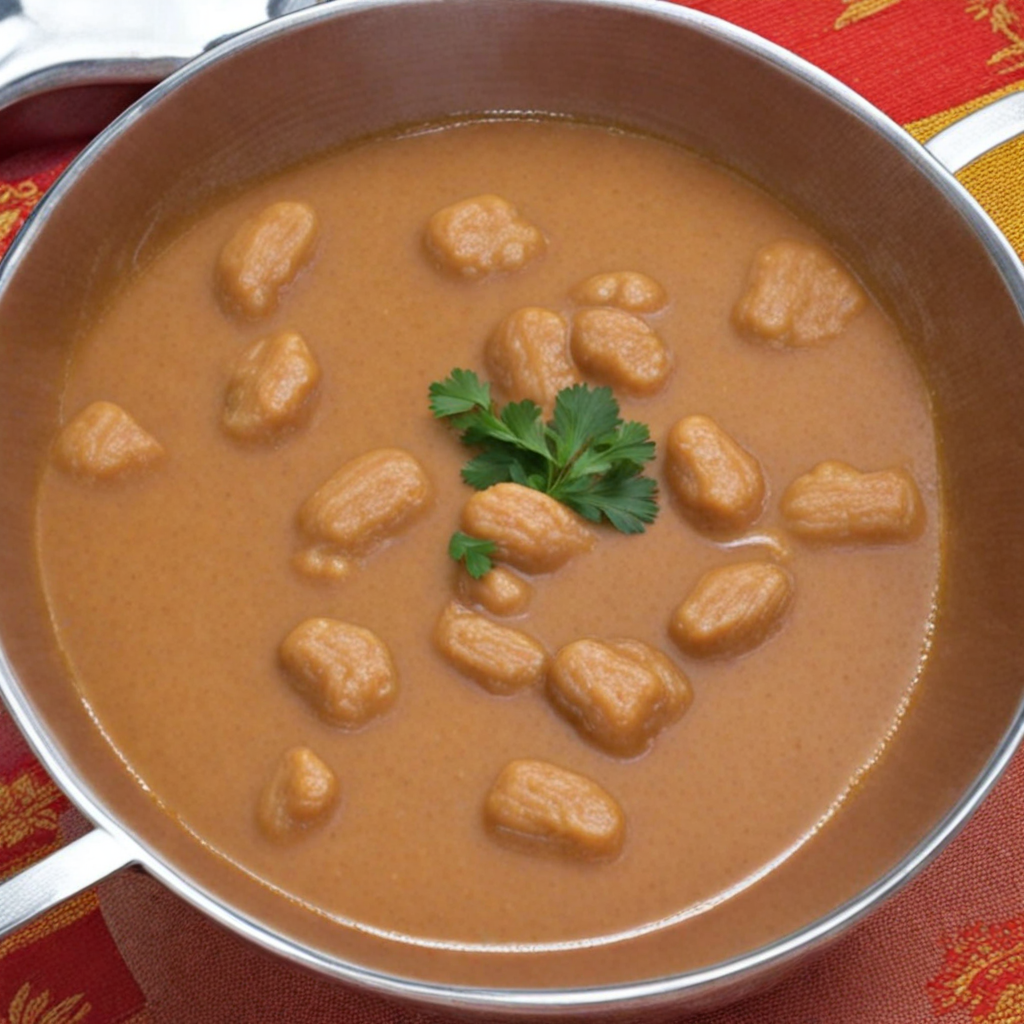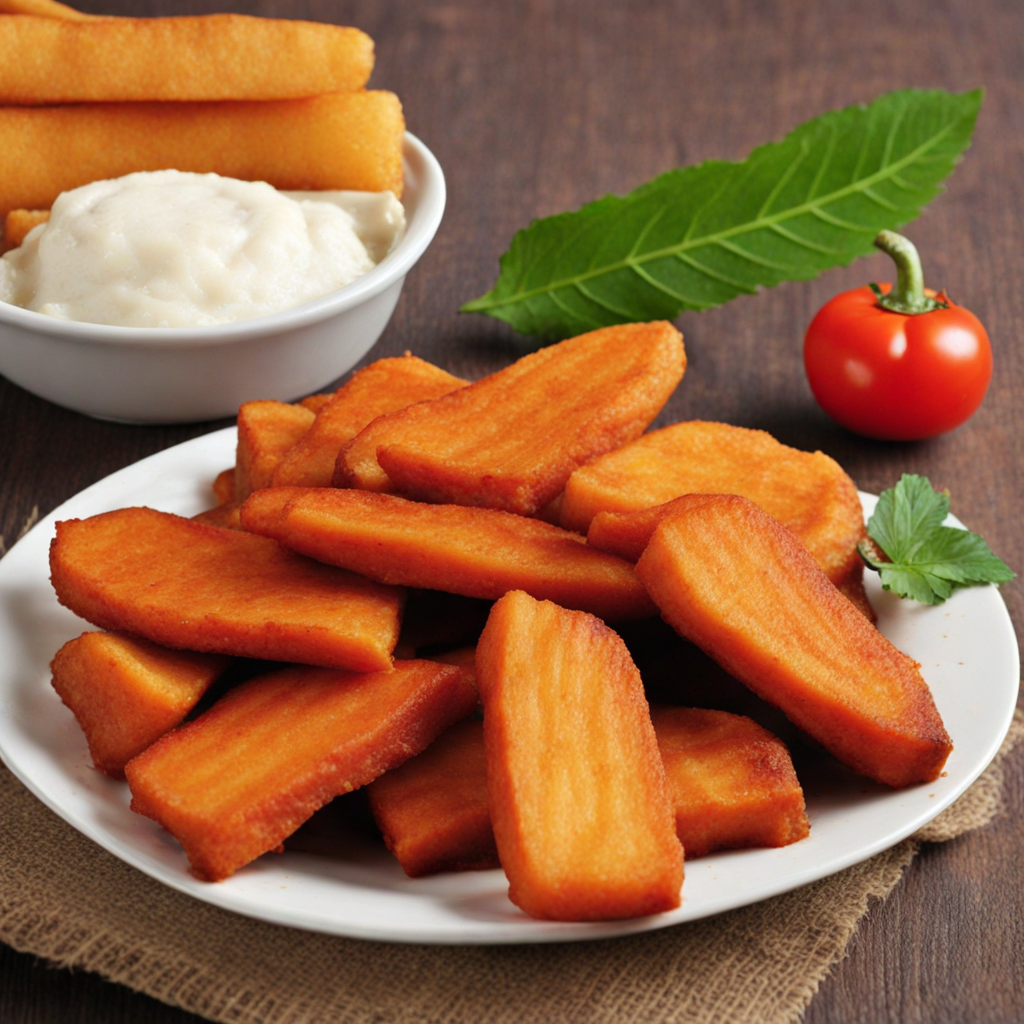Bitterleaf Soup
Bitterleaf Soup, known locally as Ofe Onugbu, is a traditional Nigerian dish that showcases the rich culinary heritage of the Igbo people. This unique soup gets its name from the bitterleaf plant (Vernonia amygdalina), which lends a distinctive flavor that is both earthy and slightly astringent. The bitterness of the leaves is often balanced with a variety of other ingredients, creating a harmonious blend of tastes. The soup is typically made with a meat or fish base, often incorporating proteins like goat, chicken, or dried fish, which add depth and umami to the dish. The use of palm oil not only enriches the soup but also gives it a vibrant orange hue, making it visually appealing as well. To prepare Bitterleaf Soup, the bitter leaves are thoroughly washed to reduce their bitterness while preserving their nutritional benefits, which include vitamins and antioxidants. The soup is often thickened with ground crayfish, locust beans, or a blend of ground seeds, providing a nutty flavor that complements the other ingredients. The preparation process usually involves simmering the meat or fish with spices, onions, and seasonings, before adding the bitterleaf and thickening agents, resulting in a hearty and flavorful dish that is perfect for sharing. Bitterleaf Soup is typically served with a side of fufu, pounded yam, or rice, making it a fulfilling meal that caters to different palates. The combination of flavors - the bitterness of the leaves, the richness of the meat, and the aromatic spices - comes together to create a truly unique taste experience. Whether you are enjoying it at a family gathering or a local eatery, Bitterleaf Soup offers a delightful introduction to the diverse world of Nigerian cuisine, embodying the essence of communal dining and the joy of savoring traditional flavors.
How It Became This Dish
Ofe Onugbu: A Culinary Journey Through History #### Origins of Ofe Onugbu Ofe Onugbu, a traditional soup from the southeastern region of Nigeria, particularly among the Igbo people, embodies both culinary artistry and cultural significance. The name "Ofe Onugbu" translates to "bitter leaf soup," a direct reference to its primary ingredient, *Vernonia amygdalina*, commonly known as bitter leaf. This leafy green is indigenous to Africa and has been utilized in various forms of traditional dishes for centuries. The origins of Ofe Onugbu can be traced back to the pre-colonial era when the Igbo people thrived as agrarian societies. The cultivation of crops and foraging for wild plants were integral to their subsistence. Bitter leaf, with its distinctive taste and health benefits, was highly regarded. The soup evolved as a practical means to combine locally sourced ingredients, reflecting the agricultural practices and environmental resources of the region. As trade routes developed, the inclusion of various proteins, such as goat, chicken, or fish, transformed the dish into a more substantial meal, catering to the growing needs of communities. #### Cultural Significance Ofe Onugbu is more than just a meal; it is a cultural emblem for the Igbo people. It is often served during significant social gatherings, such as weddings, funerals, and festivals, reinforcing the communal bonds and heritage of the Igbo culture. The preparation of Ofe Onugbu is typically a communal activity, with family members coming together to cook, which fosters unity and shared identity. The soup is also imbued with symbolic meanings. For instance, the bitterness of the leaf is often interpreted as a metaphor for life's challenges, suggesting that one must endure the bitter moments to appreciate the sweet. This philosophy resonates deeply within Igbo traditions, where resilience and perseverance are celebrated values. Additionally, Ofe Onugbu is considered a restorative dish, often served to nursing mothers, as it is believed to aid in lactation and overall health. In a religious context, Ofe Onugbu may feature in ceremonies honoring ancestors or during special rites, symbolizing respect for heritage and the continuity of traditions. The act of sharing this dish during communal meals reinforces social cohesion, creating a sense of belonging among participants. #### Development Over Time As Nigeria experienced various socio-political changes, the culinary practices surrounding Ofe Onugbu evolved. The introduction of new ingredients, cooking techniques, and influences from neighboring cultures enriched the traditional recipe. For instance, the availability of other spices and vegetables due to globalization allowed for greater creativity in preparing Ofe Onugbu, making it adaptable to different palates while maintaining its core identity. In the post-colonial era, especially from the 1970s onwards, urban migration transformed food practices. Many Igbo people moved to urban centers, leading to the fusion of traditional dishes with urban lifestyles. Ofe Onugbu became popularized beyond its regional confines, appearing in restaurants and homes across Nigeria and among the diaspora. This transition often meant quicker preparation methods and the incorporation of more readily available ingredients, such as pre-packaged bitter leaf or frozen meats. The rise of social media and culinary shows in the 21st century further propelled Ofe Onugbu into the global culinary spotlight. Chefs and home cooks alike began to share their recipes online, showcasing variations that reflect personal touches while honoring tradition. This digital age has not only preserved the traditional elements of Ofe Onugbu but also introduced it to new audiences, allowing for cross-cultural exchanges that highlight the dish's unique qualities. #### Ingredients and Preparation The traditional preparation of Ofe Onugbu involves a few essential ingredients: bitter leaf, a source of protein (such as goat meat, chicken, or fish), ground crayfish, palm oil, and seasonings such as salt and pepper. The soup base is typically thickened with ground seeds, such as *ogbono* (wild mango seeds) or *ukodo* (cocoyam), depending on regional preferences. The process begins with washing the bitter leaf to reduce its inherent bitterness, which can be a labor-intensive task but is crucial for achieving the right flavor balance. The protein is then boiled until tender, followed by the addition of palm oil and the other ingredients. The soup is simmered until the flavors meld together, creating a rich, aromatic dish that is typically served with a side of fufu, pounded yam, or rice. #### Contemporary Interpretations Today, Ofe Onugbu continues to adapt and flourish within the context of modern Nigerian cuisine. Chefs experiment with fusion dishes that incorporate international flavors while retaining the essence of the traditional recipe. For instance, some variations might include the use of coconut milk for a creamier texture or the addition of quinoa as a healthier alternative to fufu. In urban settings, Ofe Onugbu has also found its place in food festivals and culinary events, where chefs showcase their interpretations to celebrate Nigerian heritage. This evolution reflects a broader trend in the culinary world, where traditional dishes are reimagined to cater to contemporary tastes while maintaining their cultural roots. #### Conclusion Ofe Onugbu is a testament to the rich culinary heritage of the Igbo people and Nigerian culture as a whole. Its journey from a simple, locally sourced soup to a cherished dish celebrated at social gatherings reveals the intricate relationship between food, community, and identity. As it continues to evolve amidst globalization and urbanization, Ofe Onugbu remains a powerful symbol of resilience, unity, and cultural pride, bridging the past with the present and ensuring its place in the future of Nigerian cuisine. Through every bowl of Ofe Onugbu served, the stories, traditions, and flavors of the Igbo people live on, nourishing both body and spirit in a world that is ever-changing yet deeply connected to its roots.
You may like
Discover local flavors from Nigeria







